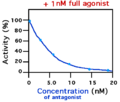Receptor antagonist facts for kids
A receptor antagonist is a special kind of molecule that acts like a blocker in your body. Imagine your body's cells have tiny "locks" called receptors. Normally, other molecules, called agonists, are like "keys" that fit into these locks and cause something to happen inside the cell. A receptor antagonist is a key that fits into the lock but doesn't turn it. Instead, it just sits there, stopping the real key (the agonist) from getting in. This can slow down or stop certain actions in the cell.
These blockers are an important part of how your body keeps everything balanced, a process called homeostasis. Sometimes, scientists create these antagonists as medicines to help treat different health conditions. For example, some heart medicines are called "beta blockers" because they block certain receptors in the heart.
Contents
What Are Receptor Antagonists?
Receptor antagonists are molecules that attach to specific spots on cells, known as receptors. When they attach, they stop other molecules from binding there. Think of it like someone standing in a doorway, preventing anyone else from entering. This action helps to control what happens inside your cells.
How Do Receptor Antagonists Work?
When an antagonist binds to a receptor, it doesn't cause any action itself. Its main job is to prevent an agonist from binding. An agonist is a molecule that normally activates the receptor and causes a biological response. By blocking the receptor, the antagonist stops the agonist from doing its job. This can reduce or completely stop the effects that the agonist would normally create.
For example, if a certain molecule makes your heart beat faster, an antagonist could block the receptors for that molecule. This would help to slow your heart rate down.
Why Are Receptor Antagonists Important?
Receptor antagonists are very useful in medicine. They are used to treat many different conditions because they can control specific body functions. By blocking certain receptors, doctors can:
- Slow down an overactive body process.
- Reduce pain signals.
- Lower blood pressure.
- Treat allergies.
They help keep your body's systems working correctly and in balance.
Images for kids
See also
 In Spanish: Antagonista (bioquímica) para niños
In Spanish: Antagonista (bioquímica) para niños
 | Audre Lorde |
 | John Berry Meachum |
 | Ferdinand Lee Barnett |


